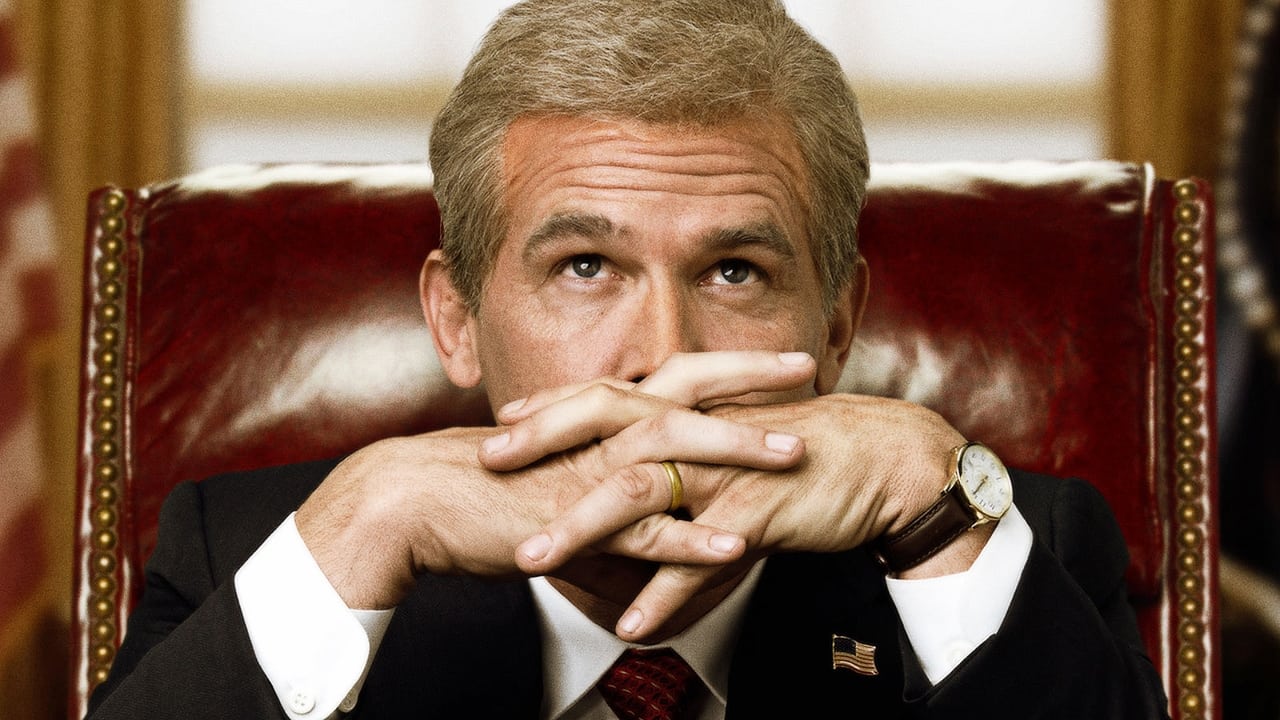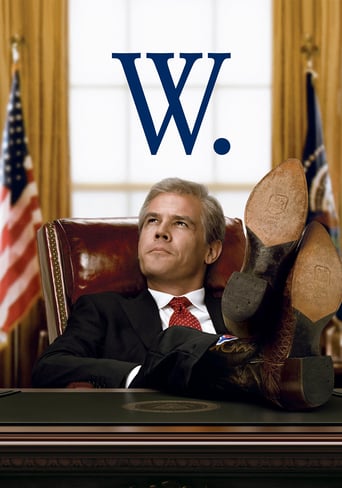

I like the storyline of this show,it attract me so much
... View MoreWhat makes it different from others?
... View MorePlot so thin, it passes unnoticed.
... View MoreThe tone of this movie is interesting -- the stakes are both dramatic and high, but it's balanced with a lot of fun, tongue and cheek dialogue.
... View MoreIf George W. Bush was anything, he wasn't his father. His father, George H.W. Bush was originally a New Englander, born in Massachusetts and then grew up in Vermont. While George H. W. did not have a Texas accent, son George W. did, growing up mainly in Houston and Midland, Texas. George W. sported cowboy hats, consumed burgers and beers, and boozed it up with broads at bars unlike his father who was the consummate intellectual New Englander, although both went to Yale. The present bio-pic is a kind of montage of the life of George W. Bush, interspersing scenes from his presidency with those of his formative years.Josh Brolin offers one of the best performances of his career, portraying the younger W. Bush as a carousing adolescent whose irresponsibility with booze is only matched by his exceptional driving techniques, which involve swerving through streets and running into things. Some of the best scenes are Bush's early years where appears almost diametrically opposite from his prominent father. While his father (James Cromwell in an equally compelling performance) was tempered and intellectual, Bush is the free-wheeling party animal. His first "test" is when he rushes Delta Kappa Epsilon, a Yale fraternity, where during a hazing, he's able to outdo his fellow rushers. (Legend has it the character of Bluto from "Animal House" was based on George W. when he was a member of the Yale frat house!) He is portrayed as a directionless scatterbrain, unable to hold down jobs and careers for any length of time. Unlike his steady father, W.'s drinking continually worsens, and he often proposes to women he barely knows.Frequently, we fast-forward to the Bush presidency. Richard Dreyfus is outstanding as Dick Cheney, and honorable mention goes to Jeffrey Wright as Colin Powell. His presidency is as scattered as his adolescent years, not quite knowing who is doing what in his cabinet. There is a sense that others with more intellect than himself are actually calling the shots behind his back. In an interesting early scene, during lunch with the Vice President, Cheney proposes a "hypothetical" scenario in which the President takes it too literally and compromises his sandwich as a result!Back in the formative years, Bush volunteers to help his father in his presidential bid. And then has life-changing experience after he's boozed it up hard one night. He goes on a jog which does not go as planned and by the end of the sequence, he's rubbing shoulders with Evangelicals. Eventually he would convert, help to bring out the Evangelical vote in favor of his father in 1988, and become governor of Texas in 1994. And then he would run for president.A thoroughly entertaining film which ponders more questions than it answers. Who was the real George W.? In a few places, we see W. standing in the middle of an empty baseball field, trying to catch an imagined fly ball. Every time the scene returns, the ball is more uncatchable. Which maybe speaks to various aspects of W. Was it that he couldn't quite catch the life he desired? Or maybe he was over-reaching? Or maybe the figure of W. is us, and the ball represents him, and we can't quite grasp him? Certainly not Stone's best film, but a good one.
... View MoreI watched this in 2016 for the first time and it's just sad to see how bias the film and acting is in terms of representing all the left wing bigotry they have for Bush and Republican party. The reviews by others are predictably confident that Stone's portrayals and spot on and show the "real" characteristics of Bush. Right. Even the "Trivia" comments that Brolin lost lots of weight to play a younger Bush then had to put it back on to play an aging Bush. On the tails of Clinton's obsession with Cheeseburgers and fries, one can only imagine that was Bill's request in light of Bush's healthy lifestyle.I'll just leave it at this, there's no getting around the idea this movie was made as a vehicle for Stone to get his message out about a man he and other liberals disagree with. So much for an honest biography that comes anywhere close to factual or fair and balanced.
... View MoreI was reluctant to see this film for a long time. The reason for that reluctance was the lack of desire in reliving what I considered to be the period in which our country was governed by the least able man in the history of this republic. Starting with the stolen election of 2001 (in which his brother was a willing accomplice), the 8 years of "Dubya's" presidency were lackluster at best and criminal at worst. Having said all this, I bit the bullet and finally watched the film and my reaction shocked me. I even ended up liking (just a little bit) poor Dubya. As was once said in a MadTv skit which played a mock debate between Bush and Kerry, Kerry says "I know why America loves you, it's like loving a retarded baby" and that's the truth! There are moments that utterly hysterically funny in this film and yet don't come across as mocking or degrading. I dislike Texas "swagger" (or "walking" as they call it in the film) and yet Stone portrays it all in a very palatable way. The acting is excellent, the dialogue is well written, and it all moves along at a good pace and plays out very well on the screen. The relationships within the family are fascinating to watch (Ellen Burstyn is fantastic as the very caustic Barbara) - so what I expected to watch with one eye closed I've now seen a few times and kept both eyes fully open during the entire film. Strange indeed.
... View MoreMy personal favorite Oliver Stone film is NIXON (1995), a really in-depth and well-rounded look at a controversial and polarizing figure. Despite Stone being politically the opposite of Nixon, he delivered a surprisingly strong portrait, which managed to be sympathetic, critical and tragic. In early 2008, I first heard about plans for a similar film about George W. Bush and grew excited. Sadly, Stone would not be able to pull NIXON off again.I remember seeing the first teaser trailer for W. It showed Josh Brolin in character, being told "You're a Bush! Act like it!" by his father, followed by a montage of all the key players set to "What a Wonderful World." I sent this teaser to my father, who had had no idea that this film was being made. He responded "Is this a trailer for a real movie, or is it an Internet skit?" He wasn't joking; he genuinely didn't know. And that right there sums up the whole problem that the finished film would have; it's VERY confused about it's identity and tone. My father managed to articulate it all perfectly.W. never quite gets off the ground as a film. It seems to want to be a serious biopic in the tradition of NIXON and your typical Oscar-bait bio, but it constantly veers into caricature and outright parody. In fact most of the marketing made the movie look like a comedy, with Bush Jr's malapropisms appearing on the posters. Part of this is due to the decision to rush the film into production while Bush Jr was still in office, making the events seem too recent and not really reflected on. By 2008, we had seen so many caricatures and spoofs of the Bush administration and this film didn't seem to be doing much of a new spin on the material.But anyway, onto the film itself (I'm not discussing politics in this review. Either you love or hate the Bush family and administration. I'm discussing the film's version of events and how they play as a film). The main narrative arc of the movie is that Bush Jr is forever living in the shadow of his family legacy, in particular clashing with his stern father and his brother Jeb being the preferred son. As such, Bush Jr, initially written off by his parents as a drunken failure, eventually enters politics and becomes president to prove himself. His entire reason for invading Iraq is to show his father "I did what you couldn't do." Yet his presidency is ultimately viewed as a failure for the country, and he has tragically only damaged the family legacy he so wanted to measure up to.This angle is an interesting one, and the scenes involving Bush Jr's youth and entry into politics play well. However, the whole storyline is just too thin, and all the scenes depicting the actual presidency and Iraq invasion lack any real weight. The film offers no real political commentary; just a dramatization of the life of a man who isn't all that interesting. Unlike Richard Nixon, Bush Jr isn't a very interesting or engaging protagonist, and he never seems to be directly responsible for what happens to him, and thus is neither heroic nor tragic. When the film ends at a brisk two hours, you are left with a very superficial portrait that seemed to barely skim the surface.One final point to bring up involves Richard Dreyfuss, known for being very politically active, and who plays Vice President Dick Cheney. I remember hearing at the time that Dreyfuss was considering retiring from acting, but came back to take on this role specifically out of desire to criticize the Bush administration (although Dreyfuss ended up appearing in further films afterward, so maybe it was just a story). Dreyfuss ended up being disappointed with the finished film and called Stone a fascist. Perhaps a bit extreme, but Dreyfuss made two very good points about the film that summed up its problems: 1) It never reaches any real conclusion about its subject matter, and 2) It's missing a very important character: the American people. As such, we're shown the highs and lows of Bush Jr's presidency, but not the impact it had or consequences for the average citizen, and the films ends up lacking real historical context.In the end, W. is a film more interesting in its concept than its execution. Supposedly it was rushed out in an attempt to influence the 2008 election, but in the end, the film had some hype at the time, only to be generally forgotten after the election. Had Stone waited twenty years, he could have made a more nuanced biopic from the perspective of later history, as he did marvelously in NIXON. Instead he gave us a tiny film with nothing to say.
... View More